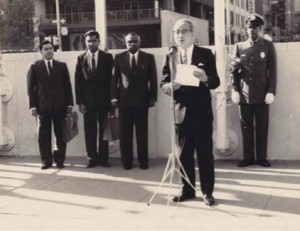Opinion: Maldives Reflects its 50 Years at the U.N.
UNITED NATIONS, Sep 19 (IPS) - The 70th anniversary of the United Nations, which culminates at the high level segment of the General Assembly this week, has prompted numerous reflections on the organization's many achievements: from its work to rebuild the world in the aftermath of war to scores of lifesaving health programs and peacekeeping efforts.
But for many of the U.N.'s smallest countries, the occasion provides an opportunity to recall how it gave us a voice – and an opportunity to help solve some of the biggest challenges of our time.
Indeed, my country's story well represents this phenomenon.
Like so many others after World War Two, we were forced to reconcile a history of foreign domination with our desire for self-governance.
 UN Secretary-General U Thant speaking at the Maldives flag raising ceremony 50 years ago. Present at the ceremony were the first Maldivian delegation, including Permanent Representative Mr. Ahmed Hilmy Didi and delegates, Mr. Abdul Sattar Moosa Didi and Mr. Ahmed Ismail.For us, that happened 50 years ago, on Jul. 26, 1965, after an agreement was signed with the United Kingdom granting independence. Two months later, we applied for membership at the U.N. and were accepted 50 years ago today.
UN Secretary-General U Thant speaking at the Maldives flag raising ceremony 50 years ago. Present at the ceremony were the first Maldivian delegation, including Permanent Representative Mr. Ahmed Hilmy Didi and delegates, Mr. Abdul Sattar Moosa Didi and Mr. Ahmed Ismail.For us, that happened 50 years ago, on Jul. 26, 1965, after an agreement was signed with the United Kingdom granting independence. Two months later, we applied for membership at the U.N. and were accepted 50 years ago today.
The significance of a small and isolated Indian Ocean archipelago joining the international community's primary decision-making forum was not lost on our first permanent representative to the body, Ahmed Hilmy Didi.
In his inaugural statement, he said: "We are proud to be the smallest Member of this body of nations. This has proved that whatever the size of a country or its population, a free State can make contribution to the cause of coexistence. A handful though we are, we dedicate ourselves to the principles of this world body and declare our faith in the support of the Charter of the United Nations."
For Maldives, U.N. membership had special significance during a time increasingly dominated by a tug-of-war between competing superpowers because we were not a "traditional" colony, but a protectorate.
That meant the United Kingdom did not govern our internal policies; rather it dictated our foreign policy. Thus independence and U.N. membership, gave us legitimacy and the autonomy needed to navigate a globalizing world.
In fact, coming as it did, at a time of rapid decolonization, larger countries expressed scepticism over the ability of so-called microstates to engage fully at the world body.
This debate persisted, and I guess you could say it left us feeling like we had something to prove.
Indeed, we have always committed the resources required to build an effective foreign service. Our international relations approach focuses on collaborative problem solving, where we seek to understand our partners' interests, explain our own, and develop solutions that satisfy the needs of all stakeholders together.
The value of such mutual understanding – and U.N. membership – came to the fore in 1987, when Maldives' capital was struck by record flooding.
In response, President Maumoon Abdul Gayoom, our president at the time launched a study and discovered manmade global warming was likely causing sea level rise, which contributed to the tidal surge. He brought the issue to the attention of leaders at the next Commonwealth summit in Vancouver, the first time the issue was deliberated at such a high level.
The access afforded by U.N. membership then allowed Maldives to rally support from many other small island states for a global push to take action on global warming.
President Gayoom also met with the Commonwealth Secretary General and won support for the first Small Island State Conference on Sea Level Rise. Island state ministers and scientists from around the world attended the meeting and they issued the Male' Declaration, one of the seminal documents in the international effort to address global warming.
Maldives would go on to be one of the most vocal advocates for a treaty to reduce the greenhouse gases responsible for global warming. In fact, since January this year it is serving as chair of the Alliance of Small Island States (AOSIS), a coalition of low-lying island and coastal nations from around the world.
We have taken a similar approach to other challenges, such as the mechanism we proposed to deal with security challenges faced by island states; the risk climate change poses to the enjoyment of human rights; and the inadequacy of the U.N.'s development measurements.
The incumbent President Abdulla Yameen Abdul Gayoom's bold initiatives of economic diversification, youth empowerment, and democratic consolidation have helped build resilience in our fragile islands, which rely heavily on the marine sectors of fisheries and tourism.
But it is our global warming advocacy that has come full circle this year. Late November through December, the international community will gather in Paris for what is widely regarded as its last opportunity to sign a treaty capable of averting the worst impacts of the crisis.
Years of inaction have made many climate impacts unavoidable. But, if not for the leadership of small island states, made possible by their U.N. membership, any solution at all might well already be out of reach. That is worth remembering.
The views expressed in this article are those of the author and do not necessarily represent the views of, and should not be attributed to, IPS – Inter Press Service.
© Inter Press Service (2015) — All Rights ReservedOriginal source: Inter Press Service
 Global Issues
Global Issues